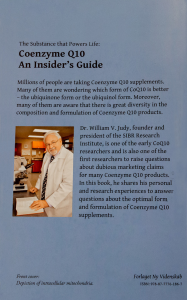
Myxomatous mitral valve disease is the most common heart disease in dogs. It often leads to congestive heart failure. The Cavalier King Charles Spaniel is especially at risk of developing mitral valve disease at an early age. From the onset of congestive heart failure in dogs with mitral valve disease, the median survival time is less than a year even with medical therapy [Christiansen 2020]. Applied early enough, Coenzyme Q10 supplements may increase the life expectancy and quality of life for dogs at risk of heart disease.
- improved cellular energy production
- enhanced antioxidant protection against lipid peroxidation
- anti-inflammatory effects
- reduced endothelial dysfunction
Typically, the CoQ10 supplement is given by mouth as a capsule or as a liquid. It is possible, of course, to squeeze the CoQ10 filling out of a capsule onto the dog food.
Pharmacokinetics Study of Repeated Oral CoQ10 Dosing of Spaniels
Now, a research team in Denmark has investigated the pharmacokinetics of oral dosing of Cavalier King Charles Spaniels over a three-week period [Christiansen 2020].
The researchers enrolled 19 Cavalier King Charles Spaniels with mitral valve disease in randomized, single-blind, placebo-controlled crossover study.
The dogs were randomly chosen to take 100 mg of Coenzyme Q10 (ubiquinone) twice a day for three weeks and then placebo for three weeks or to do in reverse order.
Outcomes of the Three-Week CoQ10 Supplementation of Dogs

Dr. William Judy describes an interesting CoQ10 study in large dogs on pages 59-62 of his book: The Insider’s Guide to Coenzyme Q10, now available from amazon.com. ISBN: 978-87-7776-186-7.
The researchers have published the following study outcomes in a peer-reviewed journal:
- The dogs’ total plasma CoQ10 concentrations increased significantly from baseline to the after-treatment period.
- Thirteen dogs reached the threshold of a total plasma CoQ10 concentration of ≥ 2.0 microg/mL.
- There were individual variations in the dogs’ uptake of the oral CoQ10 supplement just as have been noted in humans [Lopez-Lluch 2019].
- The average half-life of the CoQ10 was 2.95 days. The interquartile range was 1.75–4.02 days.
- The particular CoQ10 formulation used in the experiment was well-tolerated in the dogs.
- There were no significant differences between the CoQ10 treatment and the placebo treatment with respect to the severity of the dogs’ mitral valve disease and in the dog owners’ perceptions of their dogs’ quality of life.
N.B. A three-week supplementation period – sufficient for studying the drug’s pharmacokinetics – is not long enough to see clinical improvement in heart disease. A long-term study similar to the Q-Symbio study is needed for that purpose.
Importance of the Formulation of the CoQ10 Supplement
The formulation of the CoQ10 supplement is of supreme importance for the following reasons:
- The Coenzyme Q10 raw material is a crystalline powder.
- Cat and dog intestinal systems, like human intestinal systems, can barely if at all absorb the CoQ10 crystals.
- In all three cases, the body temperature is below the melting point of the CoQ10 crystals; body temperature is too low to dissolve the Coq10 crystals to single CoQ10 molecules, which can be absorbed.
- There are numerous diverse CoQ10 formulations available on the market; there is considerable variation in the absorption and bioavailability of these different formulations. Some will give hardly any absorption at all.
- In this study, the researchers chose to use a formulation with documented good bioavailability [Lopez-Lluch 2019]. In fact, they used the same preparation that was used in the two-year Q-Symbio study of the effect of Coenzyme Q10 on morbidity and mortality in chronic heart failure in humans [Mortensen 2014].
The Coenzyme Q10 and placebo gelatin capsules used in the study were produced by Pharma Nord in Denmark. However, the Pharma Nord company had no role in the study design; no role in the collection, analysis, and interpretation of the study data; no role in the writing of the journal article; and no role in the decision to publish the study results. The researchers declared no conflict of interest [Christiansen 2020].
Dosage of the CoQ10 Supplement in the Dog Study
The researchers chose to use a relatively high daily dose – two times 100 mg – because they wanted to raise the dogs’ plasma CoQ10 concentrations above the 2.0 microg/mL level thought to be necessary for the realization of heart health benefits [Christiansen 2020].
The observed half-life of almost three days seems to indicate that 100 mg/day or 2 x 100 mg/every other day in divided doses may be sufficient [Christiansen 2020]. However, correct dosage will vary according to the size and body weight of the dogs.
Thai Study of CoQ10 Supplementation of Dogs with Symptoms of Heart Failure
In a 2018 study reported in the Thai Veterinary Medical Journal, CoQ10 supplementation (2 x 100 mg daily) of 13 dogs diagnosed with mitral valve disease and with the symptoms of heart failure for 28 days was associated with significant improvement of systolic function (the pressure exerted when the heart muscle contracts).
The researchers suggested that the increased systolic function could result from the effect of the CoQ10 supplementation on ATP production in the heart muscle mitochondria. The CoQ10 supplementation may improve the availability of ATP for heart muscle contraction [Tachampa 2018].
Bottom Line – CoQ10 Supplementation
Coenzyme Q10 supplement formulations vary widely in their composition, and, consequently, CoQ10 supplements vary significantly in the CoQ10 bioavailability that they provide [Lopez-Lluch].
Given a documented formulation – why take a chance on an undocumented product? – and a correct dosage, Coenzyme Q10 supplementation may well improve the survival and quality of life of dogs and cats at risk of heart disease [Mortensen 2014].
Sources
Christiansen LB, Morsing MK, Reimann MJ, et al. Pharmacokinetics of Repeated Oral Dosing with Coenzyme Q10 in Cavalier King Charles Spaniels with Myxomatous Mitral Valve Disease. Antioxidants (Basel). 2020;9(9):E827. Published 2020 Sep 4.
Gollakner R. Coenzyme Q-10. VCA Hospitals. 2020. Retrieved from https://vcahospitals.com/know-your-pet/coenzyme-q-10
López-Lluch G, Del Pozo-Cruz J, Sánchez-Cuesta A, Cortés-Rodríguez AB, Navas P. Bioavailability of coenzyme Q10 supplements depends on carrier lipids and solubilization. Nutrition. 2019;57:133-140.
Mortensen SA, Rosenfeldt F, Kumar A, et al. The effect of coenzyme Q10 on morbidity and mortality in chronic heart failure: results from Q-SYMBIO: a randomized double-blind trial. JACC Heart Fail. 2014;2(6):641-649.
Puotinen CJ. CoQ10 for Heart Health in Dogs. Whole Dog Journal. 2019. Retrieved from https://www.whole-dog-journal.com/health/heart-disease/coq10-for-heart-health-in-dogs/
Tachampa K et al. Effects of coenzyme Q10 supplementation on cardiac troponin I level, heart rate variability, and echocardiographic profiles in canine with myxomatous degenerative mitral valve disease: a pilot study. Thai J Vet Med. 2018;48(3):443-452.
The information provided in this review article is not intended as medical advice and should not be used as such.
14 November 2020








Leave A Comment